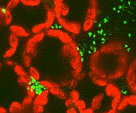Plant Pathology, Department of

Department of Plant Pathology: Faculty Publications
ORCID IDs
Document Type
Article
Date of this Version
2012
Citation
Han et al. BMC Plant Biology 2012, 12:33
Abstract
Background: The development of plant gene transfer systems has allowed for the introgression of alien genes into plant genomes for novel disease control strategies, thus providing a mechanism for broadening the genetic resources available to plant breeders. Using the tools of plant genetic engineering, a broad-spectrum antimicrobial gene was tested for resistance against head blight caused by Fusarium graminearum Schwabe, a devastating disease of wheat (Triticum aestivum L.) and barley (Hordeum vulgare L.) that reduces both grain yield and quality.
Results: A construct containing a bovine lactoferrin cDNA was used to transform wheat using an Agrobacterium-mediated DNA transfer system to express this antimicrobial protein in transgenic wheat. Transformants were analyzed by Northern and Western blots to determine lactoferrin gene expression levels and were inoculated with the head blight disease fungus F. graminearum. Transgenic wheat showed a significant reduction of disease incidence caused by F. graminearum compared to control wheat plants. The level of resistance in the highly susceptible wheat cultivar Bobwhite was significantly higher in transgenic plants compared to control Bobwhite and two untransformed commercial wheat cultivars, susceptible Wheaton and tolerant ND 2710. Quantification of the expressed lactoferrin protein by ELISA in transgenic wheat indicated a positive correlation between the lactoferrin gene expression levels and the levels of disease resistance.
Conclusions: Introgression of the lactoferrin gene into elite commercial wheat, barley and other susceptible cereals may enhance resistance to F. graminearum.


Comments
Copyright 2012 Han et al; licensee BioMed Central Ltd. This is an Open Access article distributed under the terms of the Creative Commons Attribution License